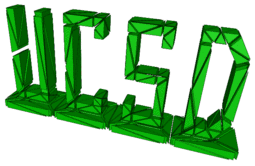| Michael Holst | ||
| https://ccom.ucsd.edu/~mholst/ |
Distinguished Professor of Mathematics and Physics UC San Diego |
|
|
Math 272A (Numerical Partial Differential Equations)
Course Topics: Numerical Treatment of Partial Differential Equations Instructor: Prof. Michael Holst (5161 AP&M, mholst@ucsd.edu; Regular Office Hours: TBA) Term: Fall 2020 Lecture: 10:00a-10:50a MWF, Zoom (See Canvas for Zoom Links and info) TA: None Discussion: None Main Class webpage: http://ccom.ucsd.edu/~mholst/teaching/ucsd/272a_f20/index.html Canvas/Zoom:
NOTE: You will need to be coming from an official UCSD IP address, either from a campus machine or via a VPN to campus, in order to get free access to these three books. If you still have problems accessing the books, please contact me (email above). CATALOG DESCRIPTION: 272A. NUMERICAL PARTIAL DIFFERENTIAL EQUATIONS I (4) [Fall 2020] Survey of discretization techniques for elliptic partial differential equations, including finite difference, finite element and finite volume methods. Lax-Milgram Theorem and LBB stability. A priori error estimates. Mixed methods. Convection-diffusion equations. Systems of elliptic PDEs. Prerequisites: graduate standing or consent of instructor. NOTE: For reference, here is the catalog description of the other two parts of 272 that will run in Winter and Spring 2021: 272B. NUMERICAL PARTIAL DIFFERENTIAL EQUATIONS II (4) [Winter 2021] Survey of solution techniques for partial differential equations. Basic iterative methods. Preconditioned conjugate gradients. Multigrid methods. Hierarchical basis methods. Domain decomposition. Nonlinear PDEs. Sparse direct methods. Prerequisites: MATH 272A or consent of instructor. 272C. NUMERICAL PARTIAL DIFFERENTIAL EQUATIONS III (4) [Spring 2021] Time dependent (parabolic and hyperbolic) PDEs. Method of lines. Stiff systems of ODEs. Space-time finite element methods. Adaptive meshing algorithms. A posteriori error estimates. Prerequisites: MATH 272B or consent of instructor. GENERAL THEME OF THE COURSE: Math 272ABC was designed as a survey of numerical methods for partial differential equations, with a strong focus on the rigorous analysis of these methods. Both finite difference and finite volume methods can be interpreted as particular variations of Petrov-Galerkin methods, and as a result they have a much closer relationship to finite element methods than is generally known. We will cover most of the topics listed in the catalog description in the order listed, and we will also cover a few advanced topics. Each of the quarters will involve some review of basic tools in real and functional analysis and approximation theory, as needed for the particular topics of the quarter. GRADES AND IMPORTANT DATES: There will be 3-4 sets of homework problems passed out about every 2-3 weeks, which will be based on the materials covered in lecture. There will also be a single exam at the end of the course, based (very) heavily on the homework problem sets. Your grade in the course will be based on these three metrics:
WHERE TO FIND MORE DETAILED COURSE INFO (CANVAS) The webpage you are viewing is meant to be a very short point-of-contact for students looking for basic information about the course. More detailed information is found on your Canvas page for this course, which will play the role as the main information and materials hub for the course, including links and connection information for all of the Zoom lectures and other meetings. ZOOM LECTURE ACCESS FOR REGISTERED STUDENTS: The Canvas website is now available and it contains the Zoom link for all of the lectures, beginning with the first lecture. The first time you connect to the Zoom lectures for this class you will need to fill out a simple registration form, but after than simply clicking on the link will take you to the lecture. ZOOM LECTURE ACCESS FOR WAITLISTED AND/OR AUDITING STUDENTS: If you are a UCSD student and are either waitlisted, or want to audit the course, please email me and I will send you a Zoom link to the first lecture. NON-UCSD/NON-CANVAS ACCESS: If you are not officially registered in the course and so cannot access the course and Zoom links through Canvas, please contact me via email (address above) and I will try to get you access in some other way. Please put "272" somewhere in the subject line so that I can make sure to address it sooner rather than later. |
